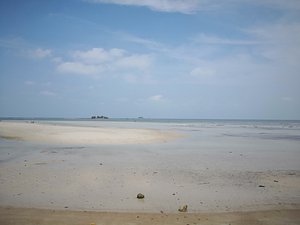Latest News for: walter summers
Edit
Colleton residents awarded for preserving county history
Walterboro Live 01 Nov 2021
By VICKI BROWN ... 2021 Awards ... The “Paul and Jacob Walter Award” is named for the two brothers who founded the summer colony of Hickory Valley, which was established in 1784 by the Paul and Jacob Walter families ... “The Paul and Jacob Walter Award” was presented to the law offices of McLeod, Fraser & Cone, now located at 111 East Washington Street ... ....
Edit
Political Journalists Address the Connections Between Local and National Politics at IOP Forum
The Harvard Crimson 27 Oct 2021
Walter said Biden began the summer with “a plan that looked pretty good” — expecting a strong economy and recovery from Covid-19— but the president’s goals lost momentum as the Delta variant spread ... “Starting in June or July, Covid became much less of a hot [vaccination] summer and much more of a hot mess summer,” Walter added.
Edit
 The Paducah Sun
27 Oct 2021
The Paducah Sun
27 Oct 2021
City talks next steps for Southside
 The Paducah Sun
27 Oct 2021
The Paducah Sun
27 Oct 2021
Southside enhancements are one of the priorities that were adopted by the Paducah City Commission back in March ... The Southside Rise and Shine neighborhood clean-up event took place over eight weeks this summer in different Southside neighborhoods. Littleville, Walter Jetton, Kolb Park, Uppertown, River Park, Dolly McNutt, Ella Munal and Farley Place.
Edit
Iras Joy Warner Reed
Tooele Transcript Bulletin 26 Oct 2021
Her grandpa Ira was so happy when she was born that she was named after him to reflect “Ira’s Joy.” She had a happy childhood with many memories made at the family cabin in Millcreek Canyon where she and her family spent most of their summers. Iras met Walter S ... Iras was preceded in death by her parents, her husband Walter S.
Edit
Research into hybrid pumpkins due to rising temperatures
Fresh Plaza 22 Oct 2021
Professor of vegetable science and breeding at Southern Illinois University at Carbondale Alan Walters knows his pumpkins ... grow pumpkins in southern Illinois,” Walters said.
Edit
California Campus Tour Spotlights ANCA Empowerment Programs for Armenian Youth
Asbarez 22 Oct 2021
... California, spotlighting internship and job placement opportunities offered through the Hovig Apo Saghdejian Capital Gateway Program, Leo Sarkisian Summer Program (LSI) in Washington, the Walter and Laurel Karabian Fellowship, and regional internships in Southern California.
Edit
Climate change could mean fewer and smaller pumpkins. Researchers are on quest for a hybrid pumpkin.
The Mercury News 21 Oct 2021
Alan Walters has jack-o’-lantern pumpkins on his front stoop — not carved, because the fruit wouldn’t last long if it was ... At the SIU Horticulture Research Center in Carbondale — where summer heat indexes can top 100 degrees — Walters is working on a solution ... “When you’re producing pumpkins only 8 to 10 pounds, that’s not very good,” Walters said.
Edit
Tunnel 29: Escape beneath the Berlin Wall
RNZ 21 Oct 2021
It's shrouded in complete secrecy to the point where very few other government ministers knew apart from Walter Ulbricht, who is the leader of East Germany, it's very much his plan ... “It all begins on the night of a children's fair on a Saturday in the middle of the summer, Walter Ulbricht picks that date for a reason.
Edit
 The McDonough County Voice
21 Oct 2021
The McDonough County Voice
21 Oct 2021
Dizzy, Satch and Thome: How an unassuming Canton field hosted baseball's greatest players
 The McDonough County Voice
21 Oct 2021
The McDonough County Voice
21 Oct 2021
It's a glorious guestbook of baseball history about two dozen names deep ... He pitched two innings." ... The Canton Park District has been upgrading the area with new signs, and over the summer put up a sign honoring Ems Field. Canton historian Mike Walters — a former head coach for the high school baseball team — researched the details for the sign ... .
Edit
Top 50 daily girls soccer stat leaders for Tuesday, Oct. 19
NJ dot com 20 Oct 2021
Check out the lists below to see the daily stat leaders for Tuesday, Oct. 19, in three statistical categories. goals, assists and saves. *These numbers are based off stats reported by coaches to njschoolsports.com by 10 p.m. on Tuesday night. The N.J ... Player School G. Sydney Spilsbury Manalapan 3 ... Imagen Walters Middlesex 1 ... Summer Reimet Ocean City 1 ... ....
Edit
"Unexpected increase in demand for Refresh nets after the summer"
Fresh Plaza 19 Oct 2021
delicate crops with a short cycle, and they create a favorable micro-climate when it comes to light and temperature during the summer months," explains Walter Ruggia, technological innovation manager at Retilplast. Walter Ruggia.
Edit
 The Citizens
19 Oct 2021
The Citizens
19 Oct 2021
DAVID CARROLL: I’m dreaming of a slow news day
 The Citizens
19 Oct 2021
The Citizens
19 Oct 2021
CBS Sunday Morning recently aired a story about Mount Airy, North Carolina, the inspiration for Mayberry of “Andy Griffith Show” fame ... Even in the tumultuous 1960s, the revered news anchor Walter Cronkite would take the entire month of August, and then some, to go sailing. Why? August was like a summer holiday for news ... each day ... Recommended for you ... .
Edit
The Best Halloween Movies on Netflix Right Now
The Wrap 16 Oct 2021
Spooky Season is officially here, which means it’s the perfect time to watch Halloween movies ... Lucky for you, we’ve put together a curated list of the best Halloween movies on Netflix right now ... Netflix ... “Monster House” became an instant Halloween classic when it debuted in the summer of 2006. The film kicks off when the Walters leave their son D.J ... Mr.
Edit
 Metrowest Daily News
14 Oct 2021
Metrowest Daily News
14 Oct 2021
Landmark for sale. 'Queen of Millis,' the former Rossi's, is on the market
 Metrowest Daily News
14 Oct 2021
Metrowest Daily News
14 Oct 2021
He spent about 18 months restoring the 1887 summer home built by Helen Van Kleeck, daughter of the town's namesake, Lansing Millis ... Gilded Age summer home ... After the Van Kleecks, along with their son, Walter, became summer residents at Rock Lawn during the fall of 1888, the mansion became a center of lively entertainment.
Edit
West Jersey Football League stat leaders through Week 6
NJ dot com 13 Oct 2021
The 2021 high school football season is heating up and plenty of players have delivered terrific performances. Check out the list below of West Jersey Football League statistical leaders through Week 6 of the regular season ... NOTE ... The N.J ... Walter Clymer Eastern 31 64 372 2 ... 10 ... Malik Moore-Summers Cedar Creek 4.5 ... Tommy Walters Northern Burlington 4 ... ....
- 1
- 2
- Next page »
















